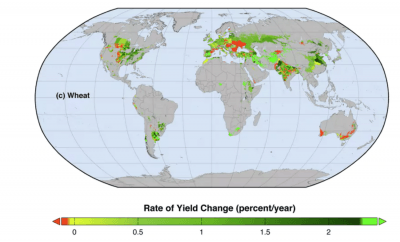Despite the attempt to increase the productivity of crops through modern agricultural techniques, a recent study found that crop yield has not been rising at a sufficient pace to meet the projected demand by 2050. The study analyzes the historical improvements in crop yields for corn, rice, wheat and soybeans. The solid lines in the graph below show that growth has been growing at a consistent rate over that past few years. However, they also show what would happen if this growth rate continues, which is a rate that is unsustainable. The dashed lines show how productivity would need to grow even more rapidly in order to satisfy the expected demand in 2050, essentially doubling global food production.
This additional wheat production graph below shows that crop productivity is not the same across the world and is actually stagnating. In the U.S. Midwest, wheat yields per acre have been rising at a 2 percent per year. But in parts of India or Eastern Europe, they’ve basically flat-lined. It is assumed that the countries experiencing this are simply not using their resources such as fertilizers properly. However, on the other hand, some parts of the world are hitting a “biological wall,” a limit on how much yields can keep rising. Even with genetic modification and better technology, there are physiological limits for plants. This in combination with the effects of global warming such as extreme heat waves that can affect crop yield are quite terrifying when considering our future. The current population of about 7 billion is projected to rise to 9.6 billion in 2050 suggesting that our crop yields will not be sustainable. Essentially, we are not growing enough to feed the world.




It is actually unbelievable to me that we are not producing enough food to feed the world. The other scary part is that we will see these effects in our lifetime. I think the graphs you chose really shed light on how serious the issue is, and how serious we need to be if we want to prevent the inevitable.
I think you bring up some really interesting points here. You have highlighted that not only is our population growing exponentially, but we will also not be able to provide enough food for the people. I think it is really frightening and we ought to take matters into our own hands. I read a fact once that about 80% of the Earth’s grain is used to feed animals, so maybe if we used that stat to inspire a decrease in factory farming (or things of that nature), there would be more food to sustain an inevitably growing population.
Your data brings up some scary points, that we are not producing enough food for the world. The problem is that not only are we running out of land to grow crops, the land is also losing its nutritional value, and our population is growing exponentially. all of these are coming together to make the problem even worse